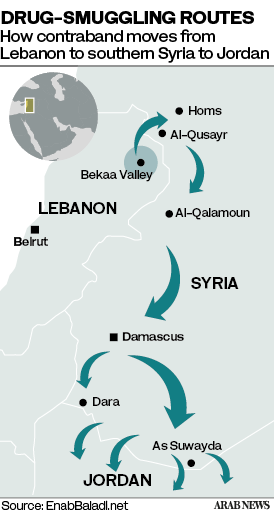BEIRUT: Lebanese security forces say they have launched dozens of operations in recent months in search of laboratories manufacturing Captagon pills, while closely monitoring coastal and land borders with Syria in an effort to identify smuggling routes.
The country’s fight against drugs, though, is an uphill battle amid multiple overlapping crises, notably its economic collapse and political paralysis.
And the elephant in the room is Hezbollah: Many suspect the Iran-backed Lebanese militant group facilitates the illicit drug trade to finance its operations while maintaining plausible deniability.
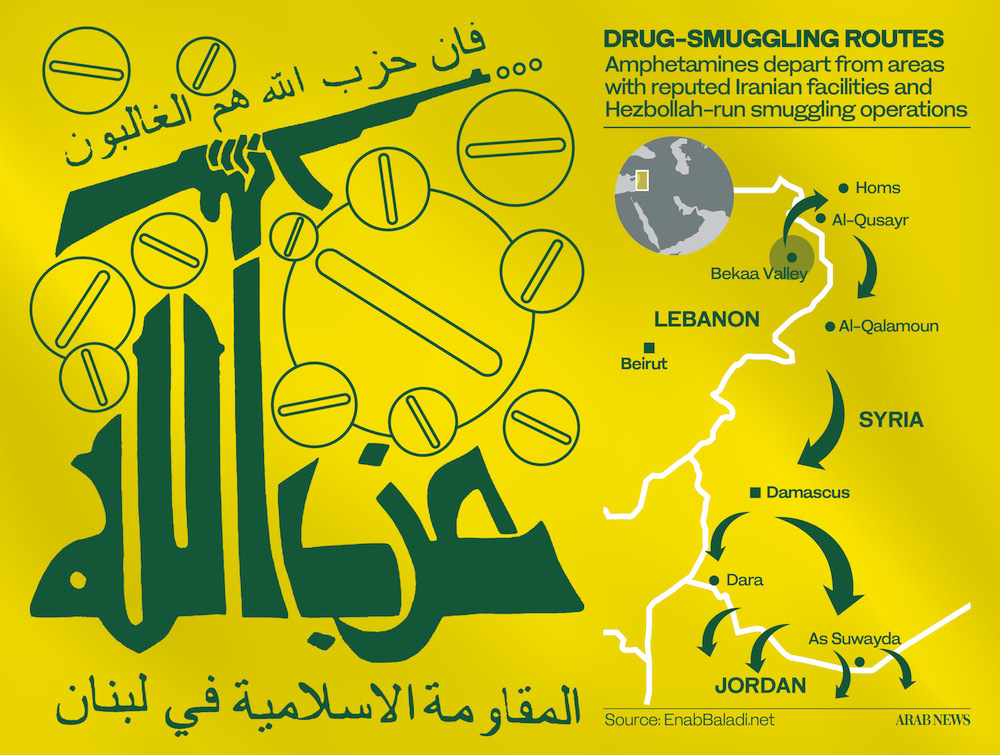
Captagon is an amphetamine, and one of the most commonly used drugs on Middle East battlefields.
Combatants addicted to the narcotic say it helps them stay awake for days and numbs their senses, giving them stamina for long battles and allowing them to kill with abandon.
Owing to its ability to make users energetic and happy, Captagon is known to have also become a popular recreational drug in the wider region.
Since Saudi Arabia’s customs authorities thwarted an attempt in April to smuggle more than five million Captagon pills from Lebanon into the Kingdom, hidden inside a shipment of pomegranates, officials say criminal syndicates have become even more “brazen.”
It was after this consignment of Captagon was discovered that Saudi Arabia suspended shipments of Lebanese fruit and vegetables entering the Kingdom or transiting through its territory.
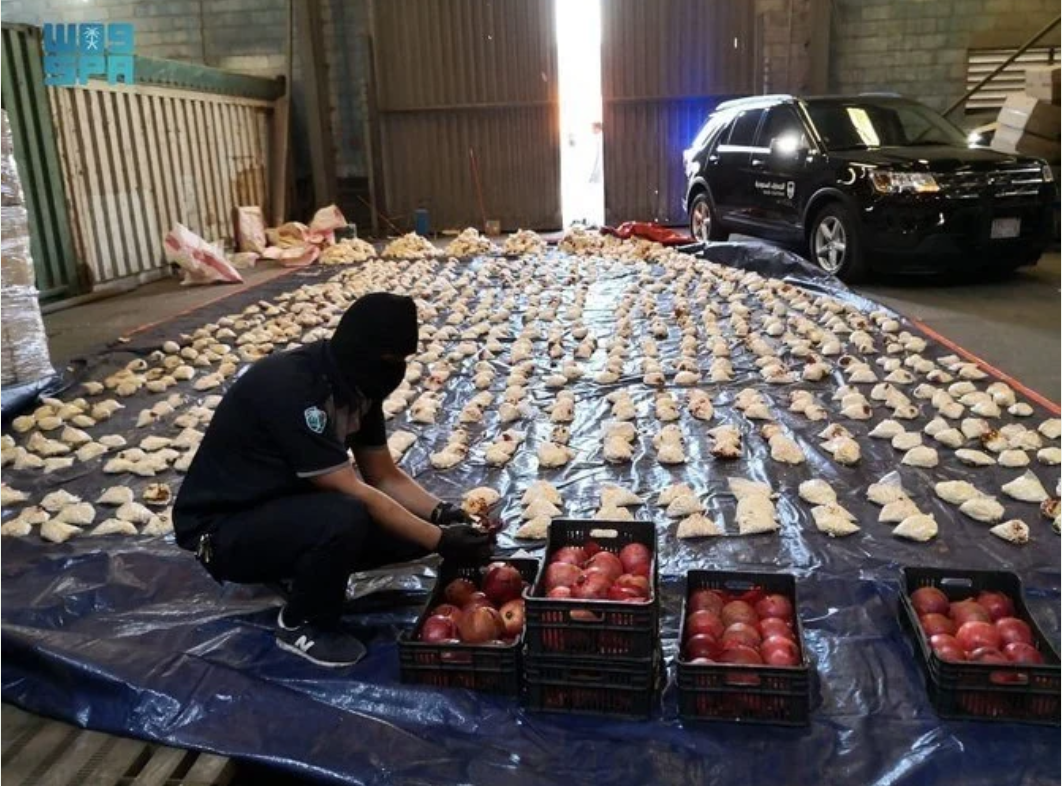
Saudi Arabia’s customs authorities thwarted an attempt in April to smuggle more than five million Captagon pills from Lebanon into the Kingdom, hidden inside a shipment of pomegranates. (SPA)
At the time, Lebanese authorities said “the drug-stuffed shipment entered Lebanon from Syria and was repackaged in an area of the Bekaa Valley before being shipped to the port of Jeddah.”
Two Syrian brothers were arrested in Lebanon soon after the discovery, accused of repackaging the shipment at an abandoned warehouse in Bekaa. But even this major bust was not enough to put the smugglers out of business.
On June 15, Lebanon’s Internal Security Forces (ISF) thwarted another attempt to smuggle 37.2 kg of Captagon pills into Saudi Arabia via Beirut’s Rafic Hariri International Airport, hidden inside a consignment of electric water pumps.
READ PART ONE
Explained: How Hezbollah built a drug empire via its ‘narcoterrorist strategy.’ Click here for more.
Three people were arrested, including the alleged ringleader, a stateless person with a history of drug smuggling, along with a Syrian and a Lebanese.
The trio reportedly confessed to setting up a smuggling network and claimed they had received the shipment from Syria before transporting it to Beirut.
The ISF’s best efforts, though, were not enough. Saudi authorities at the port of Jeddah announced another major drug bust on June 26, seizing an estimated 14 million Captagon pills hidden inside iron plates sent from Lebanon.
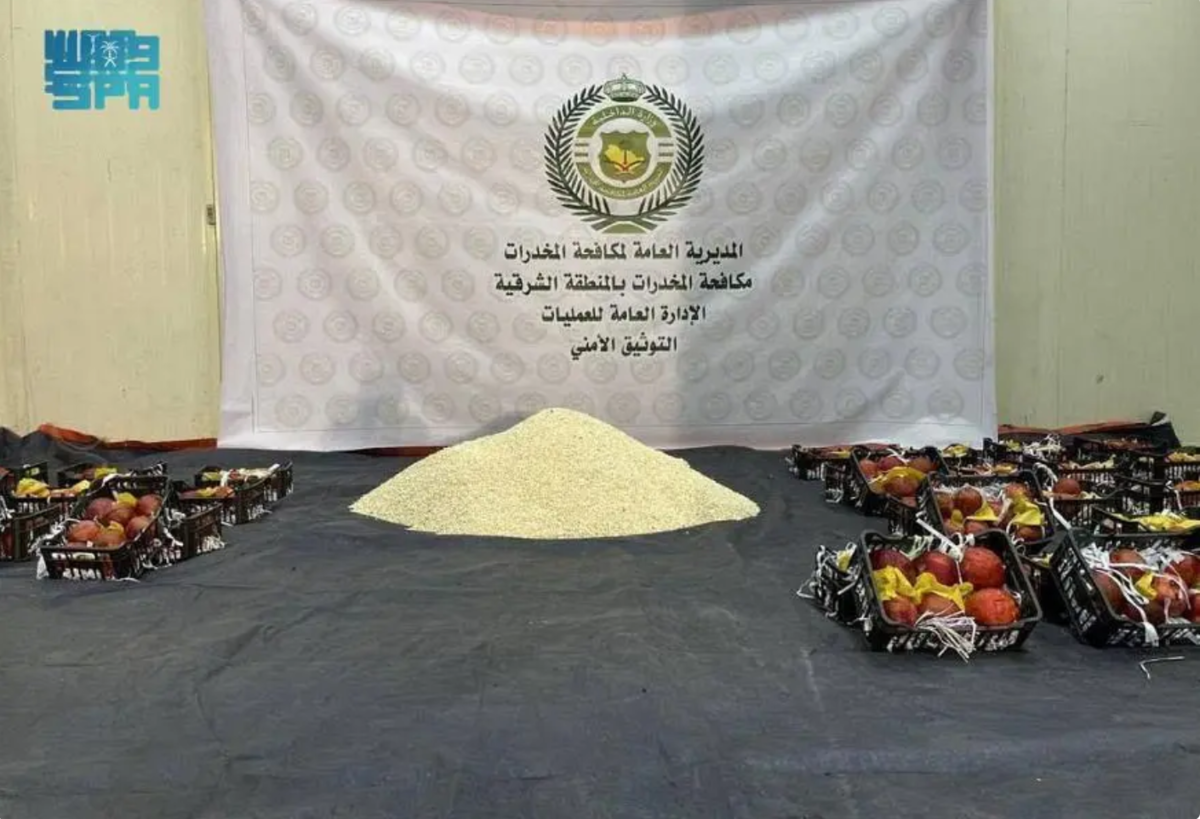
Saudi officials say criminal syndicates have become even more “brazen” in their attempts to smuggle drugs. (SPA/File Photo)
Mohammed Al-Nujaidi, spokesperson for the Kingdom’s General Directorate of Narcotics Control, confirmed the arrest of a Saudi citizen in the Riyadh area in connection with the shipment.
On June 29, Lebanese authorities seized another haul of Captagon pills also destined for Saudi Arabia. In a statement, the ISF said 17.4 kg, the equivalent of 100,000 pills, were seized. “They were expertly hidden inside medical equipment sterilization machines,” the statement added. Two Lebanese and one Syrian national were reportedly arrested.
In July 2020, Italian police and customs agents at the port of Salerno found 84 million Captagon tablets in shipping trailers that appeared to contain only paper rolls.
Intelligence officials concluded the drugs, worth an estimated $1.1 billion, originated in factories located in parts of Syria controlled by President Bashar Assad’s government.
“The amphetamines departed Syria from Latakia, a coastal city with dedicated Iranian port facilities and a known hub for smuggling operations by Tehran’s ally, Hezbollah,” the Washington Post said.
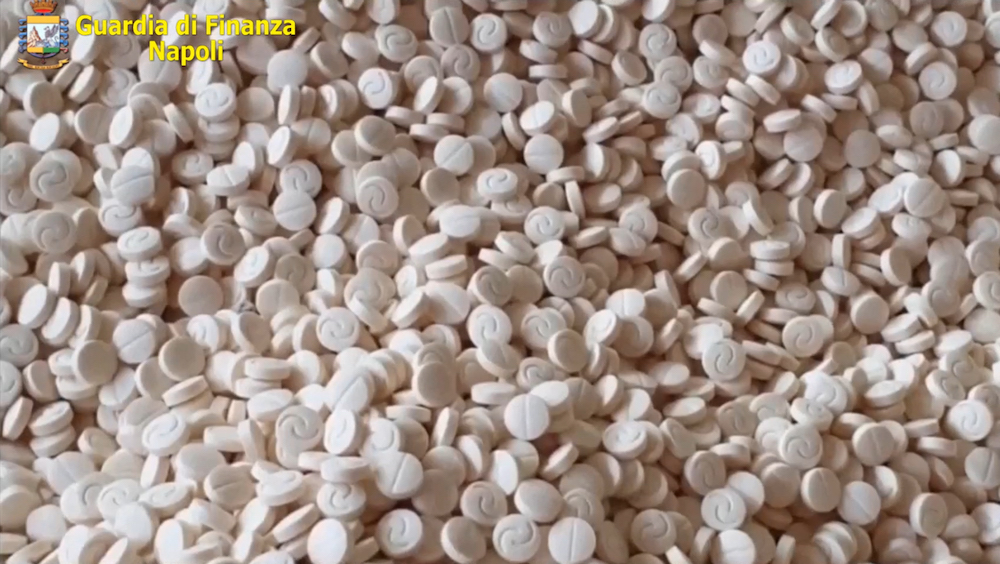
In July 2020, Italian police and customs agents at the port of Salerno found 84 million Captagon tablets in shipping trailers that appeared to contain only paper rolls. (AFP/Guardia di Finanza Handout/File Photo)
Hezbollah strenuously denies the charge that it is involved in drug trafficking, but the Post report quoted US and Middle East analysts as saying: “Facing extreme financial pressures because of US sanctions, the coronavirus pandemic and Lebanon’s economic collapse, Hezbollah appears to be growing increasingly reliant on criminal enterprises, including drug smuggling, to finance its operations.”
Hatem Madi, a former Lebanese public prosecutor, told Arab News: “The Captagon pill trade became active because it is easier to smuggle, and faster.
“It is subject to supply and demand. There is no doubt that the war in Syria has left the door open for smugglers and drug traffickers.”
Indeed, Lebanon has become a major conduit for smuggling of Captagon pills manufactured in Syria. Even before the country’s descent into civil war in 2011, its territory was used by Lebanese militias to cultivate and smuggle marijuana, generating millions of dollars.
“Captagon is manufactured in Syria, especially in the regions of Homs and Aleppo,” Brig. Gen. Anwar Yahya, a former head of Lebanon’s judicial police, told Arab News.
“In light of the events taking place in Syria, some of the factories have relocated to the villages found between Lebanon and Syria on the Anti-Lebanon Mountain Range and in the areas of Qusair and Tufail.”
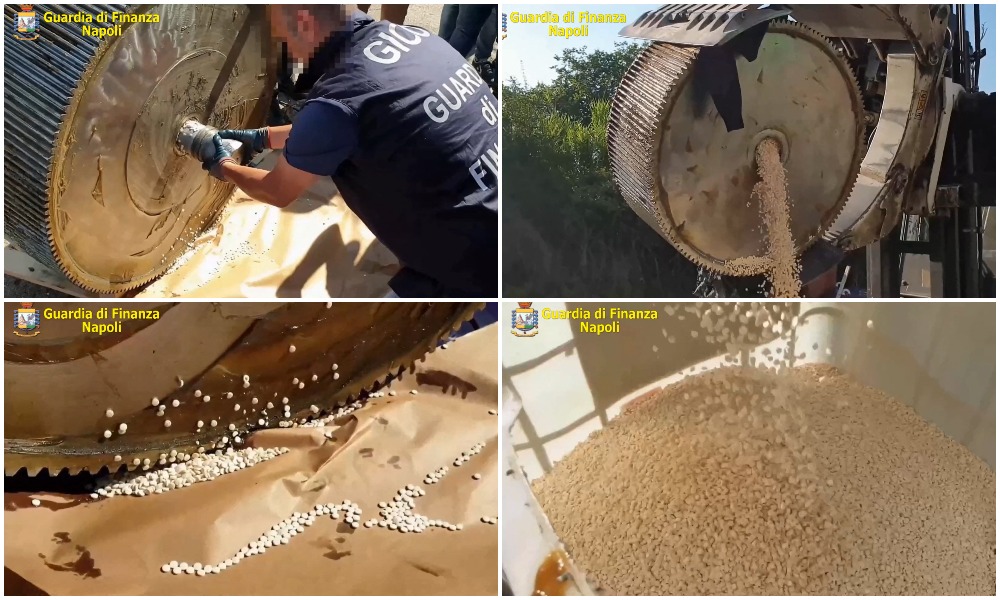
The Italian-seized drugs, in the form of 84 million Captagon tablets, were worth about €1 billion, police said in a statement, describing the operation as "the biggest seizure of amphetamines in the world." (AFP/Guardia di Finanza Handout/File Photo)
Western intelligence analysts claim Hezbollah operatives began manufacturing Captagon more than a decade ago but the drug began to gain prominence in tandem with the militia’s expanding commitments in Middle East conflicts.
“Is Hezbollah involved in manufacturing Captagon pills? This issue requires a judicial or security source,” Yahya told Arab News.
“However, the judiciary in Lebanon is silent. Is it out of fear or is the judiciary hiding something? I have no idea, but we are aware of the investigations and know who is involved.”
What is beyond doubt is that the Bekaa Valley, bordering Syria, is a Hezbollah hotbed. It has training camps in the region’s highlands and controls its own border crossings with Syria, where it has intervened in support of the Assad regime.
The most prominent person to be arrested by Lebanese authorities in Bekaa in connection with Captagon is Hassan Daqou. Dubbed the “King of Captagon,” Daqou had several business interests in Tufail, a town that overlaps the border with Syria and is controlled by Hezbollah.
However, following a local land dispute, Daqou was turned over to the Lebanese army, accused of establishing a Captagon laboratory in the area and overseeing a smuggling network sending pills to Greece and Saudi Arabia.
“Daqou has ties with Hezbollah and the Fourth Division, which is headed by Maher Assad, the Syrian president’s brother,” Mohammed Al-Hujairi, a Future Movement MP, told Arab News.
Since the beginning of 2020, counterfeit Captagon and other illicit drugs have been seized in Egypt, Greece and Jordan besides Saudi Arabia, the UAE and Italy. Western law enforcement officials have specifically linked Hezbollah to drug seizures from the Syria-Jordan border to central and southern Europe.
But what interest might Hezbollah have in the production and trafficking of drugs?
“There are unusual smugglers that have a political or ideological background,” Ashraf Rifi, a former ISF director general who later served as Lebanon’s justice minister, told Arab News. “They do not work according to profit or loss considerations. Instead, they have political goals, namely targeting the opponent’s society.”
US and European drug agencies are convinced that Hezbollah profits from the drug trade. Europol issued a report in 2020 cautioning that Hezbollah members were using European cities as a base for trading in “drugs and diamonds” and to launder the profits. In 2018, the US State Department named Hezbollah among the top five global criminal organizations.
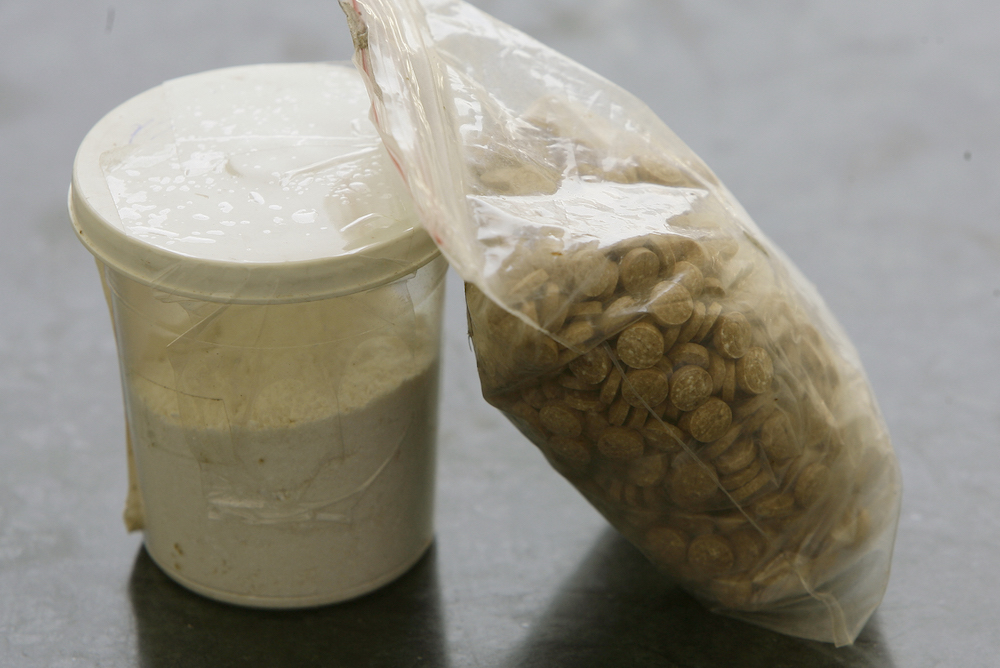
Captagon pills are displayed along with a cup of cocaine at an office of the Lebanese Internal Security Forces (ISF), Anti-Narcotics Division in Beirut. (AFP/File Photo)
Whether or not the drugs trade has been weaponized, it is certainly consuming a lot of the Lebanese government’s time and resources. According to one security source, measures taken by the security forces in recent years have led to the arrest of over 15,000 people.
Rifi said there had been seizures “unprecedented in the history of Interpol in regards to the quantities of narcotics being smuggled and the level of brazenness when it comes to smuggling and targeting.
“There is a partnership between Hezbollah and the Syrian side in terms of manufacturing and smuggling, while smuggling may also be undertaken unilaterally by one of the sides,” he said.
“The efforts aimed at countering drug smuggling from Lebanon require a wise administration. A corrupt administration that is subservient to Hezbollah makes a show of addressing the problem, but it does not actually defend the people or the interests of the country,” Rifi added.
Yahya believes Lebanon’s counternarcotics unit, a badly under-resourced and poorly utilized force, is fighting with one hand tied behind its back.
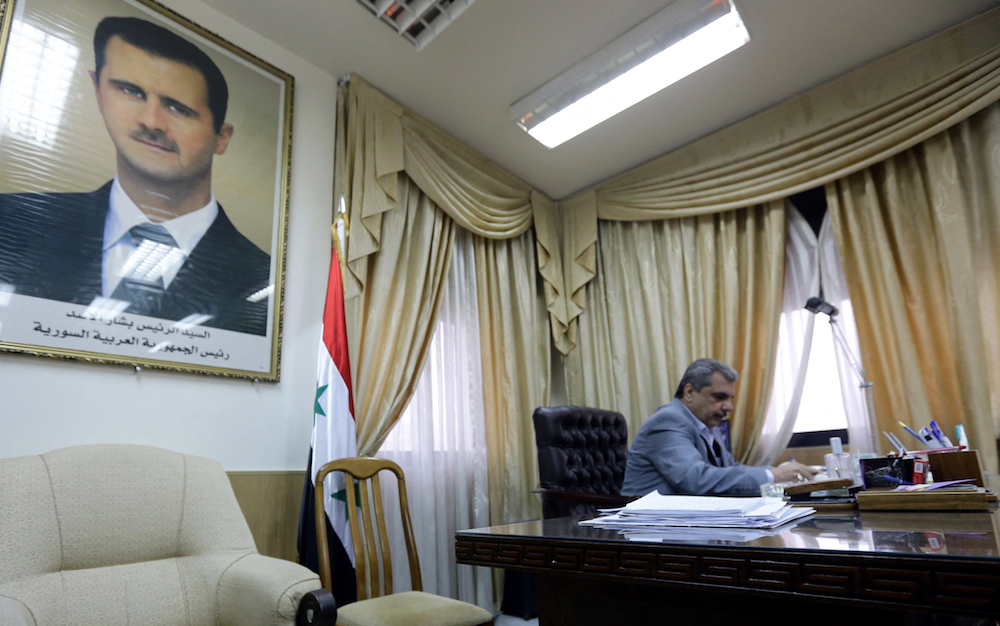
A string of major drug busts in Syria and Lebanon has drawn new attention to the trade in captagon, an illegal substance that has flourished in the chaos of Syria's war. (AFP/File Photo)
“Unfortunately, the judicial police anti-drug office, which has files that date back dozens of years and include photos and fingerprints of the people and networks involved, is being sidelined,” he told Arab News.
“Instead, we see that the bodies handling these cases are the ISF Information Division, the customs, the army or people that have no jurisdiction over such issues.”
Yahya wants Lebanese authorities to tighten control along the borders, at the airport and seaports; equip border control personnel with scanners; activate the work of the anti-drug office and provide it with the necessary tools and staff.
More broadly, Lebanon must address its economic collapse and its ability to support its security personnel, who need to provide for their families.
“The delay in the government’s formation,” he said, “is a major, and possibly the main, obstacle standing in the way of activating the security apparatus and the role of the army.”


